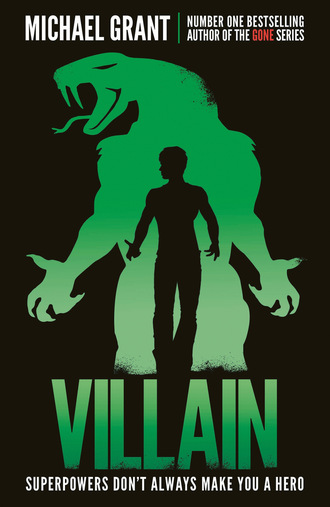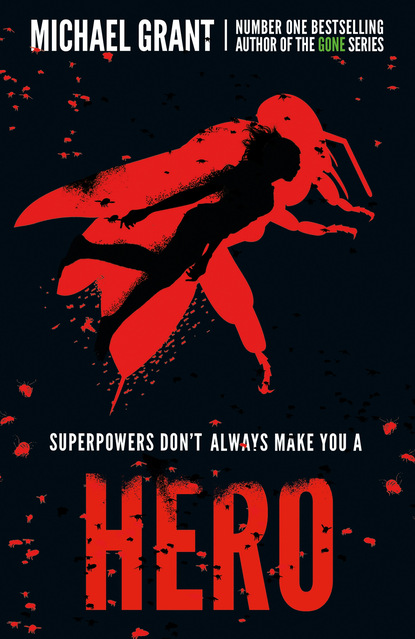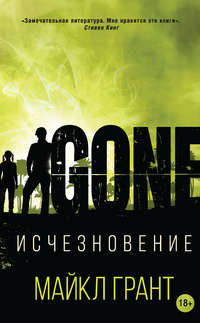
Полная версия
The Monster Series
The strength of the bond between them even impressed itself on Armo, who quite enjoyed looking at Astrid. Armo had read a book once—just one—and it had been about the Vikings, who he considered “his people,” his heritage. Give Astrid Ellison a sword and a chain-mail coat, and she would be exactly what Armo imagined a Viking shield maiden would look like. But Armo kept his admiration discreet. Dekka had told Armo about Sam, and while Sam could no longer simply raise his hands and burn a hole through you, there was a gravity to him. Armo might be (by his own cheerful admission) all kinds of difficult and headstrong, and he would never pretend to be the smartest person in any room, but he honored warriors, and, if Dekka was to be believed, Sam Temple was the living, breathing incarnation of a warrior king, some combination of Cnut the Great, Cyclops from the X-Men, and George Washington.
Dekka saw that Sam had put on weight. Not fat, but thickness in his shoulders and arms. Sam Temple at age fourteen had had terrifying power and staggering responsibility dropped on him. He had made mistakes, he had failed at times, but he had become a great leader, an inspiration. Dekka had become his strong right arm, his soldier, his advisor. Dekka and Sam were connected in ways that only two combat soldiers who’ve shared a foxhole can be.
For no particular reason, Sam reached across the coffee table and took Dekka’s hand. She squeezed back and held it for a long minute as memories flowed invisibly between them.
“Sammy,” Dekka said, shaking her head.
“Dekka,” he said.
“Bad shit happening, Sam.”
He nodded. “Yeah. It’s the same thing, isn’t it? The FAYZ, I mean.”
Dekka nodded. “The same asteroid or whatever it was, the rock, more of it has come, and more may be coming. I don’t know. I don’t know if anyone knows—maybe Shade Darby. But the powers . . . that’s all changed. I don’t know if that’s because of the dome, or because Little Pete held the gaiaphage back, but whatever, this stuff is out of control now. The main difference is that you need to physically morph.”
“Like Orc?” Astrid asked.
“Maybe. But turned up to eleven. And we can turn it on or off. I can become this . . . this thing. This creature. By choice. When I am the creature, when I am in morph—which is what we’re calling it for some reason—I can make things come apart. Shred things. People, too, if I’m not careful. Armo came by a different path, but he’s one, too, now, a COR, a Child of the Rock. Rockborn or Rockborn 2.0, some people say.” Dekka’s lip curled. She had never been a big fan of social media, and after years of being referred to as “the black lesbian” and much worse, and now frequently identified as “Lesbokitty,” her opinion had not improved. “You and Astrid are being labeled as O-COR—Original Children of the Rock. The Rockborn 2.0 include people like Shade Darby and her friend Cruz. And as you’ve seen on TV, a bunch of, um, unpleasant people.”
“We saw the video of the Golden Gate and the Port of LA,” Astrid said.
“And there’s this . . . thing,” Dekka said in a low tone. She tapped the side of her head. “When we change, when we morph, we . . . I was going to say ‘hear’ but we don’t, we just feel or sense or are aware of these . . . well, we’ve been calling them Dark Watchers. I think it’s them. I think it’s the same creatures who fired the damned asteroid toward us.”
“Dark Watchers?” Astrid said, narrowing her eyes. “Interesting. Probably just a coincidence.”
Her husband looked at her expectantly.
“It’s an old California legend,” Astrid said. “The Dark Watchers. I think it started with the Chumash Indians and was picked up by the Spanish, who called them Los Vigilantes Oscuros. Supposedly they are nonhuman creatures who only appear at twilight in the area around Monterey down to, well, down to Perdido Beach. Steinbeck actually referenced them . . . Anyway,” she concluded, sensing that her lecture was getting a bit lecture-y, “probably coincidence.”
A long, tense silence fell, broken finally by Armo, who said, “I’m sorry, but do you have anything to eat?”
Astrid patted Sam on the shoulder and said, “Why don’t you make some sandwiches?”
Something passed between Sam and Astrid, something tinged with frustration and regret. Sam nodded finally, like a condemned man accepting a judge’s just sentence. He left and Armo went with him, leaving Dekka and Astrid alone.
Astrid wasted no time. “You are not dragging Sam into this, Dekka.”
Dekka felt a surge of irritation—a very familiar feeling when she dealt with Astrid.
“He doesn’t have the power anymore. He’s just a guy, a regular human being.” Astrid stopped herself, seeing Dekka’s raised eyebrow. “Okay, he’s still Sam. But he has no powers. He’ll go with you if you ask him, you know he will. And he’ll die.” Her voice cracked on that last word. “He had his war, Dekka.”
Dekka heard the echo of her own voice saying just about those same words to Tom Peaks, the man who had run the monstrous HSTF-66 facility called the Ranch before being fired and choosing the path of the rock to become the monster Dragon.
“I don’t want him to come,” Dekka said. “Not really. I mean, look, does part of me sort of automatically reach for him when the trouble starts? Yeah, Astrid. If I live to be a hundred, whenever the shit hits the fan I’ll still probably be thinking, ‘Get Sam.’ But you’re right. And I know it.”
Astrid sighed. “So does he. He knows. He’s barely voting age and he feels he’s washed up. He doesn’t know what to do. We have money from the book and the movie, so we’re not struggling, but Sam needs to find a place for himself in the world, and it can’t be with you, Dekka.”
Irritation drained away. Dekka hung her head and said, “You know, I don’t like you, Astrid, I never have. But you stand by Sam. You love him, and I honor the hell out of that. If I ever meet someone who loves me half as much as you do him, well, that would be pretty great. I will never do anything to hurt Sam.”
Strange, Dekka thought, two young women who could not be more different, talking about Sam Temple as if he was a fragile child they had to protect. Sam and Armo came back in, laughing at some shared joke, and set sandwiches down. Armo had one halfway down his throat already. Both young men caught the mood, and Sam shot a look at his wife and then at Dekka.
“Ah. So the decision’s been made,” he said with a mixture of rueful acceptance and frustration. He shrugged. Then he held up the hands that had once had the power to blast a beam of light capable of cutting through steel. Nothing happened. “Honestly, I wouldn’t be of much use.”
Dekka said, “Right, you’re all done for, useless and pathetic.” She shook her head. “Don’t make me slap the crap out of you, Sam. I am not going to feel sorry for you, and if you feel sorry for yourself, I swear to God I will kick it right out of you.”
To Dekka’s delight and Astrid’s relief, Sam burst out laughing. “I have missed you, Dekka. You, Edilio, Lana . . . Breeze.”
Dekka felt the familiar catch in her throat on hearing that last name. Brianna, the Breeze, Dekka’s one-way, unreciprocated, hopeless, doomed, magnificent love. “We kicked more than our share of ass,” Dekka said.
Sam looked intently at his friend. “You’ve got something else to tell us, Dekka.”
“He hasn’t gotten any dumber,” Dekka said to Astrid, trying for a light tone.
“Well, he couldn’t, really,” Astrid said, playing along. It was an old joke between Astrid the Genius and Sam the surfer dude.
“Spill it,” Sam said, undeterred.
Dekka folded her hands, twining the fingers. “I don’t think it showed up on the public footage, at least not the stuff I’ve seen.”
Sam waited, and Astrid, as if sensing the need, stood up.
“Drake,” Dekka said. “Whip Hand is back.”
ASO-6
ANOMALOUS SPACE OBJECT Six was not a large chunk; in fact, by the time fiery reentry had burned off a bit, it would weigh just forty pounds on impact. The impact had been carefully calculated to be in the Atlantic Ocean, four hundred nautical miles west-northwest of São Miguel Island in the Azores.
But the loose grip of astronaut Heidemarie Stefanyshyn-Piper changed that. During a 2008 space walk, astronaut Stefanyshyn-Piper had accidentally let go of a briefcase-sized tool kit.
Because ASO-6 was smallish, it picked up a bit of a wobble when it smacked into that orbiting space garbage, and went off in a different direction than its original trajectory. It hit water thirty miles off the coast of the Kings Bay submarine base in Georgia, just north of the Florida line.
The water wasn’t deep by Atlantic Ocean standards. The rock would likely be recoverable. But the vessels intended to carry out the recovery were all about two thousand miles from the location, a trip that would take them days to complete.
In the meantime the Coast Guard cutter Abbie Burgess was dispatched to monitor the scene.
Fourteen hours later, with the undersea research flotilla steaming toward them, the Abbie Burgess sank, with the loss of twenty-one lives.
The only radio message to be heard from the Abbie Burgess was, “Oh, God! Oh, G—”
A Coast Guard helicopter sent to the scene found only a few bits of floating wreckage. And no bodies.
BRIGADIER GENERAL GWENDOLYN DiMarco did not like the office Tom Peaks had vacated at the Ranch, the secret research and development facility in the hills east of Monterey, California. It was too bland, too office-like, too normal.
Normal. Not a word to be applied to Tom Peaks himself, who had salved his hurt feelings at being demoted by taking a large dose of the rock and turning into a massive, fire-breathing, magma-vomiting, reptilian creature who’d burned down much of the Port of Los Angeles before being dragged into the channel by an even more bizarre and dangerous creature created out of starfish DNA.
Peaks had concealed the crazy within, and perhaps, DiMarco thought, his dull, cubicle-like office was part of the disguise. She had chosen a space closer to the action, and the action at the Ranch was all underground. Anyway, she’d never been much of a sun worshipper.
Her office now was a singular structure occupying one end of the great cavern, the combination cave and excavation that hid all their work from electronic eyes on satellites and drones. On Google satellite maps, the Ranch looked like what it had once been: an older, repurposed army facility.
Should call it the Iceberg, not the Ranch, DiMarco thought, nodding with grim pleasure at what she took to be a rather clever joke. Because more of it was underwater than above. Although not water, but land, earth. Dirt. Or at least a giant hole in the dirt. So, an iceberg if you meant that . . .
Well, DiMarco knew she was not a natural wit.
Her office was a long rectangle originally built as a construction office for the contractors who had excavated and built the massive underground facility. The location had the great advantage of being up high on a granite outcropping that formed a shelf a hundred feet above the cavern floor, just twenty feet below the jagged stone roof. She’d had it totally remodeled, of course, so the old corrugated-tin cladding had been replaced by reinforced concrete eight inches thick. The small, dirty windows that had been enough for the construction supervisor had been replaced with a single long window, twenty-four feet from end to end and six feet tall. Level 8 bulletproof glass, of course, just a hair over six centimeters thick, and capable of shrugging off five rounds from a high-powered sniper rifle.
Within the Bunker—as DiMarco’s office had been instantly nicknamed—were just two interior walls. One, on the left end, closed off DiMarco’s adjutant, secretary, and security detail. On the right end DiMarco had her private bathroom. But occupying fully two-thirds of the square footage was her own office, dominated by a massive steel desk partly made of armor recovered from a Russian tank that had come to misfortune in Ukraine. The desk was painted olive drab, a very military contrast to the rest of the office, which had expensive Persian carpets and rich mahogany bookshelves stuffed with everything ever written about the Perdido Beach Anomaly and the emerging field of exobiology, and a great many books on arcane aspects of genetics and the hacking of same.
Major Mike Atwell, DiMarco’s adjutant, walked in, five long strides from his own office, stepped off with careful precision to bring him just before her desk, where he executed a pivot that faintly snapped his heels together, and lay the morning briefing book on her desk.
The paper copy was a formality, of course; DiMarco already had the digital version open on her computer.
“Have a seat, Mike,” DiMarco said.
Atwell, a thirty-one-year-old West Pointer with not one but two PhDs—genetics and military history with a focus on China—was a man who would never manage to look as good as he should in his impeccably tailored uniforms. He was getting full at the waist, had shoulders that were more vertical than horizontal, and had been cursed with a face that screamed “nerd.”
“Let’s run down the top-ten list,” DiMarco said.
Atwell nodded and began from memory. He might not have shoulders, but he had prodigious recall.
“We are well beyond ten at this point,” Atwell said, earning a sharp look from DiMarco, who hated being told what she already knew. “Vincent Vu, who calls himself Abaddon the Destroyer, has been spotted subsequent to the Port of LA battle, as himself, as a kid, at a 7-Eleven in Long Beach and a Target store in Glendale, as well as appearing as Abaddon and, for reasons that remain obscure, destroying half a mile of used car lots. Three dead.”
DiMarco nodded. “I’m not sure Vu is target number one, but go on.”
“In second place, your predecessor, Tom Peaks. He’s being called Dragon in the press. Sometimes Burning Man or Hot Lizard in social media.”
“He’s number one,” DiMarco said. “You can’t just assess according to damage done, you have to consider the mental capabilities as well. Vu is genuinely mentally ill, and a teenager to boot, who knows nothing and certainly has no larger plans. But Peaks?”
“Yes, ma’am,” Atwell said, though he was far from convinced that ill was any better than evil. “In third place we have Shade Darby, with her super-speed. Very powerful and very smart, a bad combination. We’ve analyzed the videos, and the best guess is that she can hit speeds in excess of seven hundred miles an hour, which, depending on atmospheric conditions, can mean Mach 1, the speed of . . .” He let that trail off, seeing the warning look from DiMarco, the look that said, I know what Mach 1 means.
“Next up, Dekka Talent. She’s very powerful, reasonably bright, and more experienced at actual physical combat than any of the others, and probably more than any soldier currently serving in uniform, frankly. In the media they’re calling her everything from Catstein to Catzilla to Lesbokitty.”
DiMarco nodded, and her upper lip disappeared behind her lower lip, a clenched-jaw expression that often preceded an angry eruption.
No eruption this time. Not yet.
“Fifth place is Aristotle Adamo, aka Armo.”
“I made that boy!” DiMarco snapped. “I gave him power beyond anything he could imagine, and offered him . . .” She waved a hand to encompass the world of pleasure she’d tried to use to control the uncontrollable brat. This one DiMarco took personally. Dekka had been Peaks’s special project, Armo had been hers, and it was not a happy reality that the two had apparently teamed up.
“Six is Hugo Rojas, aka Cruz. She’s a trans female or gender-fluid male—we aren’t sure yet—a follower, not a leader. She seems to have the power to alter her appearance at will. She can appear as any person, old, young, big, small, any race, any gender.”
“Huh.” DiMarco grunted and turned on a sour smile. “I’m sure he, she, or it enjoys that.”
Atwell quashed his instinctive disgust at her sneering bigotry. “Seven is Francis Specter. She’s just fourteen, mother and father both members of a meth-dealing biker gang known to have been one of the gangs drawn to the Perdido Beach cave. No idea whether she consumed some rock or was down there in the hole long enough to be affected less directly.”
“What do we have on her powers?”
Atwell blew out a sigh. “Damned little, I’m afraid. She seems to be able to pass through solid objects, or allow solid objects to pass through her. We just located a seven-second snippet off a traffic camera in Glenrio, New Mexico. May I?” He indicated the remote control on DiMarco’s desk. He clicked the button to open a sliding panel that revealed a large TV monitor. A few more clicks, and they had choppy, grainy black-and-white video of a girl with jet-black hair crossing a busy highway. A car came into view, swerved madly to avoid her, and was followed by a Costco tractor trailer that slammed into her at sixty-four miles an hour.
And passed right through her: the entire length of the tractor trailer. Francis Specter had walked on out of camera range as if nothing had happened.
DiMarco had him replay it twice. “Fascinating. My first thought was that she alters her density, or the density of solid objects, but we’d see an increase in apparent size then. The lab’s current working theory is that she moves into an unseen dimension and essentially moves around the object through a fifth dimension of space-time.”
“The truck driver says all he saw was like a blurred rainbow.”
“A what?”
“He says that in the split second he saw her, she looked like a walking, blurry rainbow.”
“Why don’t we see it on the video?”
Atwell said, “Well, one, the driver could be hallucinating, or two, she’s got her back to the camera and the effect is only on her skin.”
DiMarco drummed her fingers and looked at the freeze-frame blur. “Criminal parents. If she’s bending space, it will be impossible to lock up or restrain her in any way. Pity. She’s a KOS.”
KOS. Kill on sight.
“Glenrio is hard on the New Mexico–Texas border,” Atwell said. “New Mexico authorities will not cooperate, but the gang frequently crosses into Texas, and we have people in the Texas Rangers who can . . . can do what needs to be done.”
Atwell, as a student of military history, understood that he was being given an illegal order, an order that violated the law and the Constitution. And his oath as an officer. It made him queasy. Just not queasy enough to refuse.
“KOS! And I’m not concerned with blowback. We have assets of our own, we don’t need to lean on the police,” DiMarco said. “Eighth place?”
“The Perdido Beach survivor Drake Merwin, aka Whip Hand, known to millions from the Ellison book and the movie. He’s teamed up with Peaks, which is bad enough, but worse, ordinary people think he’s Alex Pettyfer, the actor who played him in the movie. In reality he is worse than could be shown in a PG-13 movie, much worse—a psychopath and a sadist. A murderer, rapist, torturer, an all-around nasty piece of work.”
“KOS?” DiMarco frowned. “No, I think not—we want him. I assume you’ve read-in on him? The whip arm thing is not the power that interests me; he is apparently indestructible. You could run him through a blender and pour the bloody goo in the ocean, and a few days or weeks later he would be back. No, no KOS on Drake Whip Hand—he may yet be useful.”
Atwell made a note, concealing his disapproval. Atwell understood the need for drastic measures, but working with vicious animals like Drake Merwin was not why he had enlisted.
“Number nine is Malik Tenerife. A college freshman at Northwestern, high IQ, devoted, we think, to Shade Darby. We have only very preliminary information about him. He was badly burned by Peaks in the battle at the port. Doctors gave him a zero chance of surviving, but somehow he walked out of the hospital, seemingly healthy. He had an unusual effect. I just this minute got some video . . .”
DiMarco rapped her knuckles on her desk, an impatient signal to get on with it.
This time the video was from a professional news camera, showing a middle-aged nurse with a tear-streaked face.
“It was horrible, horrible, I felt as if I was on fire. The pain . . . I could look down and see that I wasn’t hurt, but the pain, the agony . . . It was unbearable. I honestly thought that if it didn’t stop very soon, I would kill myself.”
“Huh,” DiMarco said thoughtfully. “We want Mr Tenerife if we can get him. Let’s see just how devoted he is to the girl who dragged him into all this.”
“Finally, number ten is still Justin DeVeere, aka Knightmare.”
DiMarco gave him a hard look. “Young Justin is in custody and working for us now.” She stabbed a finger in the direction of the cavern outside her window. “He’s caged and tagged, and enlisted as a private in the US Army. And not even that sword of his can cut through a foot of reinforced concrete and six inches of electrified Vanadium steel.”
Atwell licked his lips nervously. “Ma’am, I think we should remember that both Dekka and Armo were formerly held here, and both escaped.”
“They escaped Tom Peaks, not me!” she said, adding grit to the last two words. “Anyway, if we’re going to start counting our own kept monsters, hell, we’ve got worse than Knightmare locked up down here.”
Yes, Atwell thought grimly, and may God forgive us all. The Ranch had been doing crash research in numerous avenues: they had tried to weaponize and control the rock by feeding it various strands of animal DNA. Sometimes—Armo—it had worked. Other times it was as if the rock was mocking them, using entirely different DNA—a passing mosquito, say—to create unsustainable monstrosities. One had morphed into a human-mite hybrid, a brainless slug unable to move its bulk on eight tiny, distorted human legs.
The Ranch had also pioneered cyborgs—human-machine blends: robots with human brains, weapons systems with a human head attached, or sometimes just a brain.
Silence descended as DiMarco templed her fingers and rested her chin on her fingertips, a sign she was thinking. For a solid five minutes Atwell sat looking into space, trying to convince himself this was all right, trying to believe that years from now he would still be able to look his daughters in the eye and justify what he was doing. General DiMarco made that harder with what she said next.
“We are being handcuffed by rules and regulations that are totally inappropriate for this moment in history. We need to be able to shoot first and ask questions later. These are not street criminals, these are superpowered terrorists, mostly very young because God knows only a teenager is dumb enough to deliberately swallow a mutagenic alien virus. But young or old, they’ve already done billions of dollars in damage, not to mention cost hundreds of lives. KOS. Kill on sight! That should be the default, and we only exempt those we can use. Work for me, or take a bullet.”
“Yes, ma’am,” Atwell said, flashing mentally on the Wannsee Conference, the notorious meeting that had led to the Holocaust. There had been gutless apparatchiks there, too, nodding and saying, “Yes, sir.”
Then came the bad news he had to deliver. He’d been hoping for a good moment, but DiMarco was not in a good mood. “There’s another matter, General. The Mother Rock. We’ve got it secured here, as you know, but we’ve only just recovered data from the Okeanos Explorer, and there is a discrepancy.”
Her eyes practically burned a hole through his forehead. “Discrepancy?”
“They weighed the rock on board. We’ve now weighed it. And there is a discrepancy of nineteen pounds, four ounces.”
“Almost twenty pounds has gone missing?” Silence again, broken by a slammed hand on the desk that made Atwell jump. “Godammit! That’s 320 one-ounce doses! That does it. I’m tired of playing by the rules. Prepare a request for a national mobilization of the National Guard and a State of Emergency. We need to be kicking in doors! And let’s start with everyone who was aboard Okeanos. I want them questioned, and I don’t give a rat’s ass about how that questioning is carried out.”









